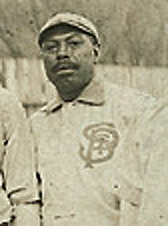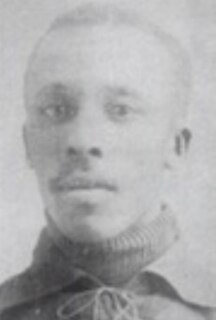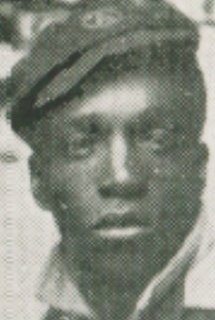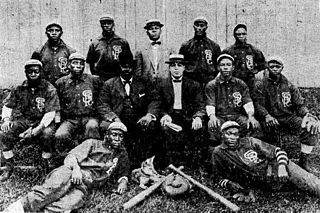
Algona is the county seat of Kossuth County, Iowa, United States. The population was 5,487 at the 2020 census. Ambrose A. Call State Park is located two miles southwest of the city.
The Chicago Unions were a professional, black baseball team that played in the late 19th century, prior to the formation of the Negro leagues.

Robert Wells Marshall was an American athlete. He was best known for playing football; however Marshall also competed in baseball, track, boxing, ice hockey and wrestling.
The Minneapolis Keystones was a small club of black baseball players formed in Minneapolis, Minnesota running from approximately 1908 to 1911.

The Algona Brownies were an independent interracial baseball team that played in the 1902 and 1903 seasons. They were based in Algona, Iowa, and was primarily made up of former members of the Chicago Unions, Columbia Giants, and Chicago Union Giants teams.

George Walter Ball was an American baseball pitcher in the Negro leagues. Born in Detroit, Michigan, from 1893 he played ten years as the only black player on minor white teams in Minnesota and North Dakota. For more than a decade beginning 1903, he played for major teams, mainly in the Chicago region. Sources say he was given the nickname "The Georgia Rabbit" and "Diamond."

Hurley Allen McNair was a baseball player in the Negro leagues and the pre-Negro leagues.

George "Chappie" Johnson Jr. was an American baseball catcher and field manager in the Negro leagues. He played for many successful teams from 1895 to 1920 and he crossed racial boundaries as a teacher and coach.

William H. Binga was an American third baseman, catcher and manager in the pre-Negro league baseball era. Born in Michigan, Binga played most of his career in Chicago, Illinois, Philadelphia, Pennsylvania, and Minneapolis, Minnesota.

Henry William "Harry" Moore was an American baseball utility player in the pre-Negro leagues. He appears as "Harry Moore," "Henry Moore," and even "Mike Moore."

Dangerfield F. Talbert was an American baseball third baseman in the pre-Negro leagues.

Harry Hyde was a Negro leagues pitcher and Infielder for several years before the founding of the first Negro National League. He played several years with Frank Leland and his Chicago Union Giants, playing with Dangerfield Talbert, Rube Foster, Chappie Johnson, Walter Ball, William Binga, and Charles "Joe" Green.
Albert Toney was an American baseball shortstop in the pre-Negro leagues. He played most seasons for Chicago teams such as Chicago Union Giants, Leland Giants, and Chicago Giants.

William Horn was an American baseball pitcher in the pre-Negro leagues. He played several years for Chicago teams like the Chicago Unions and Leland Giants. He also spent a couple of seasons with Iowa's Algona Brownies.

Joseph "Cannon Ball" Miller was an American baseball pitcher in the pre-Negro leagues. His first known games were played for the Page Fence Giants.

Archie Pate was an American baseball pitcher and outfielder in the Negro leagues.

William Holland was a Negro leagues pitcher and infielder for several years before the founding of the first Negro National League.

Frank "Bunch" Davis was a shortstop in the Negro leagues. He played for several different teams, including the Chicago Union Giants, St. Paul Colored Gophers, and Minneapolis Keystones.

Sherman "Bucky" Barton was an Outfielder in the Negro leagues.

Willis Jones was an American baseball outfielder and manager in the pre-Negro leagues.

















